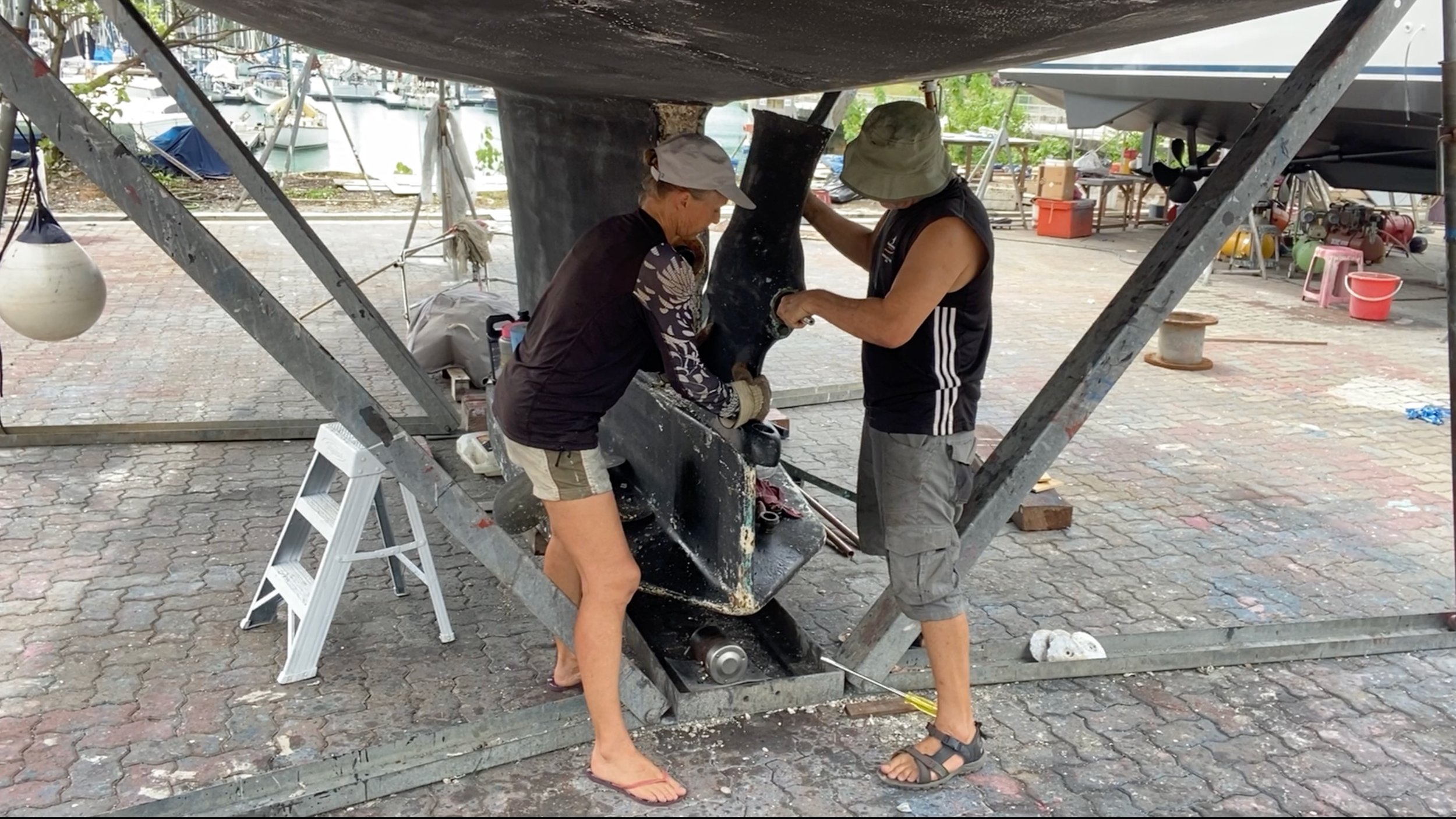Relationships and Mental Health Challenges Aboard
01-04-04
“A learning experience is one of those things that says, ‘You know that thing you just did? Don’t do that.”
Let’s face it, the live-aboard lifestyle has an irresistible allure. The freedom, the jaw-dropping scenery, the smug satisfaction of being entirely self-sufficient—these are things a nine-to-five existence in a suburban box simply can’t offer. Social media reinforces this fantasy: impossibly tanned YouTubers swanning about in turquoise lagoons, posting filtered photos of travel, adventure, and high drama. And sometimes, it truly can be all of those things.
But behind the lens, the reality is often far less glamorous. It can also be lonely, stressful, and push even the most resilient people to their limits.
This month, we witnessed yet another family throw in the towel. No screaming rows or tabloid-worthy drama—just a boat quietly slipping back into a marina for the last time, a listing appearing at the local broker’s office, and the crew heading for the airport. It’s a familiar story: the dream of cruising replaced by the reality of cramped quarters, relentless repairs, and endless bickering. One partner storms off to book a flight home while the other—often the man—is left nursing a stiff drink, wondering where it all went wrong.
Boats Are Expensive
Maintenance, mooring fees, emergency repairs—it all ratchets up the tension in an already pressurised lifestyle.
Money problems are one of the top causes of family conflicts. Living costs, debt, and disagreements over spending often lead to friction. And if you didn’t know already, boats are expensive and unpredictably so; the most expensive way to travel “for free” as they say. Maintenance, mooring fees, emergency repairs—it all ratchets up the tension in an already pressurised lifestyle.
Now, imagine trying to have a serious conversation about finances with your partner while one child is about to fall off the boom and the other is glued to a screen, oblivious to the tropical paradise outside and resentful that you’ve taken them away from their friends.
The daily grind doesn’t stop just because you’re on a boat either. Homeschooling, provisioning, and endless repairs dominate the to-do list. Couples often find themselves navigating not just the boat, but also their roles. Who’s fixing what? Who’s cooking dinner? Who’s dealing with the kids? Who’s sneaking off to the aft cabin for a moment of peace or to lose themselves in social media or news from back home.
Unpredictable weather and the constant threat of something breaking at the worst possible moment is relentless.
Live-aboard life magnifies every minor irritation, turning it into a major issue if not addressed properly and maturely. Even the most harmonious marriages feel the strain, with toddler tantrums and teenage meltdowns punctuated by unpredictable weather and the constant threat of something breaking at the worst possible moment. The clash between the urge to keep traveling and the urgent need to stop and mend things is relentless.
It’s perhaps unsurprising then that marinas witness their fair share of tearful goodbyes, alcoholism, breakdowns, and even suicides. It’s something cruisers whisper about but rarely discuss openly.
Isolation at Sea
And then there’s the company—or the lack of it. You can’t just meet an old friend for coffee to vent. Sure, you might bump into fellow cruisers at a marina, but most friendships are as fleeting as a weather window. No matter how beautiful the setting, isolation can lead to serious mental health struggles and family and marital turbulence.
No matter how beautiful the setting, isolation can lead to serious mental health struggles and family and marital turbulence.
The Silver Linings
But it’s not all doom and gloom. The live-aboard lifestyle, for all its challenges, can be a phenomenal opportunity for growth—with the right mindset. Adversity often brings maturity, self-awareness, and emotional intelligence. It can strengthen bonds between partners and children as you grow together, learn to compromise and resolve disagreements.
On a boat, you’re not just partners—you’re crew and a team. If one half of the team isn’t functioning, the boat only operates at half capacity, and that’s assuming the other partner picks up the slack.
Adversity often brings maturity, self-awareness, and emotional intelligence. It can strengthen bonds between partners as you grow together.
Of course, everyone needs “me time” to recharge. For Irenka, it’s a beach fire, a potluck and chats with fellow cruisers. For me, it’s a beer or coffee at a local beachside café and losing myself in writing. The kids? They love hanging out with other kids and diving into their hobbies, but only when screen time is capped!
Sometimes, even getting off the boat can feel like an effort, especially at an unfamiliar anchorage, but it’s amazing how a hike or merely having solid ground under your feet can reset your mood. It’s also a great way to reconnect outside the confines of the boat.
Everyone needs “me time” to recharge and it’s amazing how a hike or merely having solid ground under your feet can reset your mood.
Community is vital, but people are in short supply on the open ocean. Having distractions helps—satellite broadband or reliable access to Netflix at sea may not sound “off-grid,” but a little escapism can work wonders. Before satellite broadband, we had a hard drive packed with movies and books—but, times change and Starlink has been a real game changer in terms of entertainment and connectivity.
Buddying up with other families to share navigation decisions, tools, supplies, and advice can ease the burden. It can even lead to lifelong friendships.
Buddying up with other families to share navigation decisions, tools, supplies, and advice can ease the burden.
Division of Labour
A clear division of labour between partners is pretty important too. Discuss this before living in close quarters turns minor disagreements into major fights. But timing matters—reminding your seasick partner that they’re on galley duty probably isn’t the best idea! Be flexible, adapt to changes, and never lose sight of basic relationship advice: compromise, respect, and yes, even a bit of fun.
Privacy and intimacy are rare luxuries on a boat, but creativity and nurturing that sense of fun can turn even tight quarters into opportunities for connection—and maybe a little spice!
Scrubbing off the Barnacles
It's true, the live-aboard life isn’t for everyone. It can be tough, lonely, and occasionally feel like a slow descent into madness. Families face the added strain of parenting, homeschooling, and relationship dynamics in impossibly tight quarters. If you remember the COVID-19 lockdowns, you’ll have already had a taste of what it’s like.
For those who can weather the storms—literal and metaphorical—the rewards are unlike anything life on land can offer.
But for those who can weather the storms—literal and metaphorical—the rewards are unlike anything life on land can offer. With good communication, a strong sense of working together towards common goal, and perhaps the occasional stiff drink or Netflix movie, the life aquatic can be as magical as you dreamed.
If you’re considering this lifestyle, be realistic and manage your expectations. And if you’re already living it, don’t hesitate to reach out for help. After all, even the best boats need a haul-out to scrape off those barnacles now and again.
Enjoy the journey and adventure—and see you out there!







